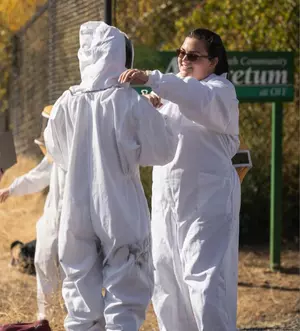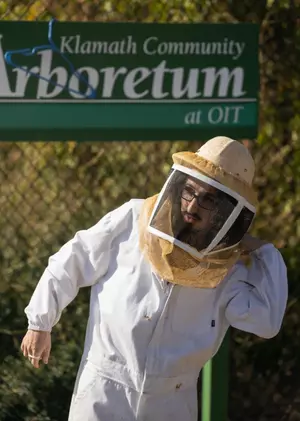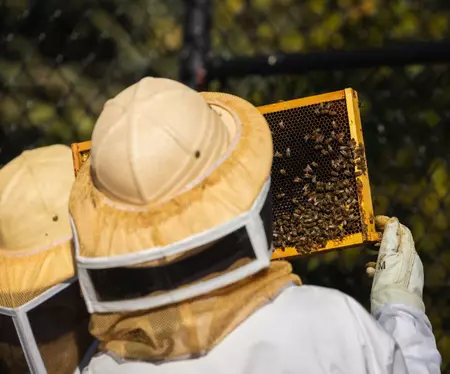
When talking about bees, especially the all-important honeybee variety, it’s difficult to avoid using puns. Uses of buzz, sweetness, hives, stingers, and so on are tempting word plays to describe the excitement and love beekeepers have for their honeybees.
At Oregon Tech’s Klamath Falls campus, Environmental Sciences student Makenzie Stieber maintains professionalism as she explains the process of suiting up to new club members.
Stieber has been involved in the Oregon Tech Beekeeping Club for two years, and as president takes her responsibility of protecting the Oregon Tech bees seriously. Although the club has 55 members this year, only four were able to join her on short notice in October to prepare the bees for the winter at the Oregon Tech Apiary. She explained the process of removing empty frames from the hives and replacing them with full frames of honey so the bees have food for winter.
“We had a mite problem in the hives over summer, so we combined the hives the previous week to strengthen them,” Stieber explained.

Joining her was Filip Trier, a fellow Oregon Tech Environmental Sciences student who is studying as an international student from Denmark. Having moved to the U.S. in May 2021, Trier joined the Beekeeping Club last year. “I like the company, the bees, nature…and also the sweet honey — it’s delicious,” Trier said.
Students from any program can join the club, which began in 2018 as a joint effort of Environmental Sciences and Mathematics. The Oregon Tech Apiary serves three main purposes: promoting awareness about pollinator decline, acting as a living laboratory for student research projects, and providing the opportunity for students to learn the ancient art of beekeeping.
Two faculty members help lead the club: Professor of Mathematics Terri Torres and Assistant Professor of Natural Science Christy VanRooyen. Torres and VanRooyen are on the board of the Klamath Basin Beekeepers Association and have been tending bees for more than 10 years.
Torres explains that the on-campus apiary helps students in a variety of ways, one of which is getting close to the bees themselves. “It’s good for students to face and conquer their fears. It’s good to do hard things,” Torres said. “Sometimes they get stung. Sometimes it’s scary. But students quickly learn that it’s not impossible to rise above the trepidation they feel. The advantages outweigh distress.”
While not all of Torres’ students spend time with the bees personally, she brings the study of bees into her mathematics coursework so students can learn more about the important part bees play in the environment.
“We have placed monitors on the hives that collect data on the weight and temperature of each hive. We discuss how to best represent these data in my classes,” Torres said.
VanRooyen has also brought the study of bees into her courses and has a variety of ongoing research projects through the Oregon Tech Apiary that involve various bee club members.
In one partnership, Torres and VanRooyen were asked if Oregon Tech could be a pollen collection site for a Belgium company called Bee O Diversity.

“Bee O Diversity was developing methods to use bees for environmental monitoring and this data collection has been happening at Oregon Tech for the last two summers,” VanRooyen said. “One of Bee O's representatives recently came out and visited our team sharing the results of their research and brainstorming ways we can continue this partnership into the future.”
Computer Systems Engineering Technology (CSET) and Renewable Energy Engineering students have also started research projects with the Oregon Tech Apiary.
In 2020, a group of CSET students led by bee club member Seth Worthylake developed a working prototype hive monitor which tracked internal hive temperature and humidity. With what they learned from the prototype monitor, Torres and VanRooyen wrote a successful Student/Faculty Innovation Grant, and in 2022 they received $11,000 from the Provost’s Office to establish more formal research in the apiary.
“We were able to purchase commercial hive monitors that track hive weight, internal hive temperature and humidity,” VanRooyen said. “We installed cameras near the hives and captured time series photography to examine bee behavior. Pollen and honey samples will soon be sent for DNA analysis so we can determine which floral species around campus are particularly important for our honeybees.”
Student researchers are also working to analyze all the data and correlate bee behavior to environmental variables such as air quality conditions, outdoor temperature, and floral resource availability. Club members Kaile Edenhofer, Quin McDowell, Makenzie Stieber, and Filip Trier are part of this work.
Last year Renewable Energy student and bee club member William Stobaugh built a mite treatment system for his senior project. Using solar panels, the system heated the hive to a specific temperature range for a specified amount of time, under the theory that mites have a different tolerance band for temperature than bees. The system is designed to raise the temperature high enough to kill the mites and leave the bees unharmed, which if finished would have the potential to save hives from the mite problems experienced this summer. Strobaugh designed a working prototype for this which could be tested by future students in the club.
VanRooyen has also developed and teaches a bee research class on campus, and a bee lab is set up for student researchers to work from and keep specimens in.
“It's been really amazing to see the club evolve from a student-interest group about learning beekeeping into an opportunity for applied learning and research,” VanRooyen said. “Student members can dive as shallow or deep as they like into the scientific side of the apiary. I feel so blessed to work with this exceptional club.”
The Beekeeping Club will keep an eye on the apiary during the winter and resume their maintenance in the spring. Torres hopes that the excitement of students in the club will continue and that they will have an opportunity to include more students in the work. “Students are always pleasantly surprised to hear they we have bees on campus,” Torres said. “There’s a need for bees for both honey and more importantly, pollination. We are doing both at Oregon Tech. I would hope to continue to educate the students about honeybees as well as continue the important research that has been started.”
###








